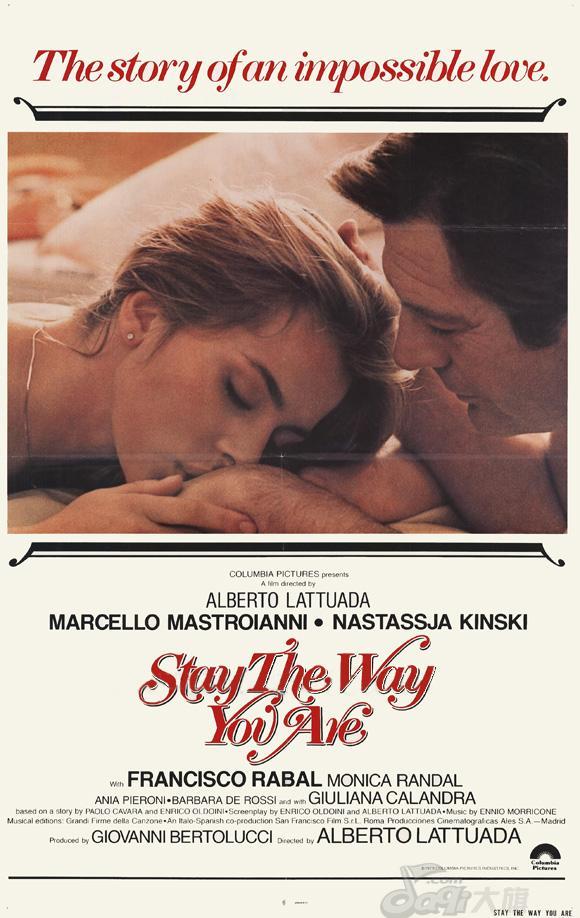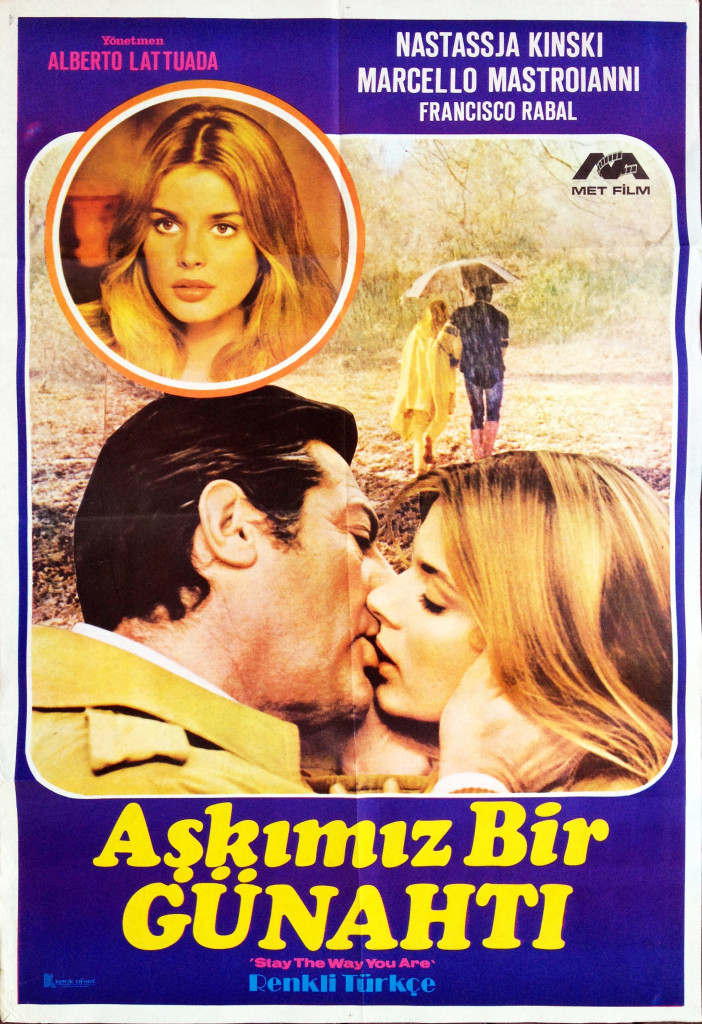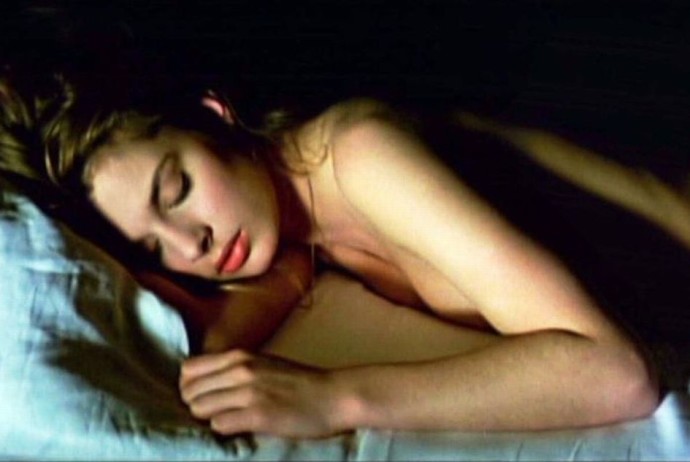Dir: Alberto Lattuada
Star: Marcello Mastroianni, Nastassja Kinski, Ania Pieroni, Mónica Randall
a.k.a. Stay as you Are, Stay the Way you Are
On the one hand, this is a ludicrous, middle-aged fantasy of a movie, based upon the wobbly premise that someone like the teenage Kinski would be even slightly interested in leaping, at first sight, into an affair with Mastroianni, more than three times her age at the time of filming (he was 53; she was 17). This would only be less credible if she turned up on his doorstep to fix the plumbing or deliver a pizza: it’s that dubious of a concept. However, both the leads do a pretty good job at selling this. There’s a reason Mastroianni was nominated three times in his career for the Best Actor Oscar, and if Kinski isn’t exactly stretched by a role as a wild-child teenager with Daddy issues, she brings a youthful exuberance and boundless energy to proceedings, that’s actually tiring to watch.
 He plays architect Giulio Marengo, resident in Rome, but working on a project in Florence. He encounters Francesca (Kinski), and there immediately appears to be a connection, as he gives her a lift back to town – only for her to vanish mid-journey, courtesy of a passing motorcyclist. But she left her phone-number behind, and it’s the start of a passionate affair. A large, incestuous spanner is thrown in the works, however, when a friend of Giulio tells him that Francesca is the daughter of Fosca, a woman whith who Giulio was in a relationship, not too far from the appropriate time-frame of Francesca’s birth. However, Fosca is now dead, and there are other possible candidates for the role beside Giulio.
He plays architect Giulio Marengo, resident in Rome, but working on a project in Florence. He encounters Francesca (Kinski), and there immediately appears to be a connection, as he gives her a lift back to town – only for her to vanish mid-journey, courtesy of a passing motorcyclist. But she left her phone-number behind, and it’s the start of a passionate affair. A large, incestuous spanner is thrown in the works, however, when a friend of Giulio tells him that Francesca is the daughter of Fosca, a woman whith who Giulio was in a relationship, not too far from the appropriate time-frame of Francesca’s birth. However, Fosca is now dead, and there are other possible candidates for the role beside Giulio.
This is where I part company with his character entirely. In the extremely unlikely event of a teenage hottie developing a crush on me, if I discovered there was even the slightest possibility she was my daughter, it would immediately reduce her to the status of platonic friend, until there was incontrovertible proof to the contrary. Not so Giulio, who continues to operate on the basis of “Well, maybe she isn’t,” and even after explaining the situation to Francesca, doesn’t take the obvious step of any kind of paternity test – they did have those in the 70’s. Instead, it’s a weird, unresolved aspect of their relationship: maybe Italians are simply less concerned about such things?
This does play somewhat like Tatort, with Kinski once again hooking up with an older, married man, though at least here, the reaction of Mrs. Marengo (Randall, looking oddly like Diana Rigg from On Her Majesty’s Secret Service) seems plausible enough. There’s a brilliant scene where Francesca is supposed to meet Giulio in town, but when he doesn’t show up, she goes to his house, where his wife answers the door, and susses the situation in about two-tenths of a second. The temperature in the room drops about thirty degrees as a result. The film does pose the tricky question: is it better to maintain a sham of a marriage for the sake of your children, even if it largely makes everyone involved unhappy?
 The film’s major advantage is Mastroianni, who comes over as genuine and likeable, which is quite impressive, given at the heart of the movie, you have to get past the whole “she’s one-third his age!” thing. Admittedly, there’s absolutely no sense of this being other than a relationship between two intelligent, fully consenting adults – they just happen to be separated by several decades in chronology. Portraying that as being neither particularly shocking, nor intrinsically unnatural, is actually quite groundbreaking and refreshing. You can understand what they see in each other, even if it isn’t much more than old/young stereotypes i.e. wisdom and calm, versus energy and enthusiasm.
The film’s major advantage is Mastroianni, who comes over as genuine and likeable, which is quite impressive, given at the heart of the movie, you have to get past the whole “she’s one-third his age!” thing. Admittedly, there’s absolutely no sense of this being other than a relationship between two intelligent, fully consenting adults – they just happen to be separated by several decades in chronology. Portraying that as being neither particularly shocking, nor intrinsically unnatural, is actually quite groundbreaking and refreshing. You can understand what they see in each other, even if it isn’t much more than old/young stereotypes i.e. wisdom and calm, versus energy and enthusiasm.
The solid performances from Kinski and Mastroianni help paper over some moments best described as strange. There’s an entire chunk devoted to a trip to Madrid for the pair, to see Giulio’s daughter, which appears to be in Spain for no other reason than it’s a Spanish-Italian co-production. Look! Landmarks! Having got that contractual obligation out of the way, the leads camp out for the rest of the time in a hotel room. There. Francesca urges her lover to bite her ass hard, and then serves him a glass of her fresh urine. No, really: that’s taken almost verbatim from my notes, and there’s just not any way to describe the scene, where it doesn’t seem truly bizarre.
Things head to a conclusion which is almost inevitable, once you hear the story of how Giulio and Fosca broke up. I’m still not sure whether it counts as satisfying or not. If it “makes sense,” in the light of what has gone before, it doesn’t present the viewer with any real resolution, and I didn’t get the feeling that many of the characters had been changed significantly by their experiences. The overall concept is of two ships – who may or may not be intimately connected – passing in the night, then heading on their separate ways. While the production values and her co-star certainly count as a step up for Kinski (I should also mention Ennio Morricone’s score, which definitely enhances proceedings), it’s not a film that will likely stay with you particularly long, and feels more like a cinematic trifle than a classic.
